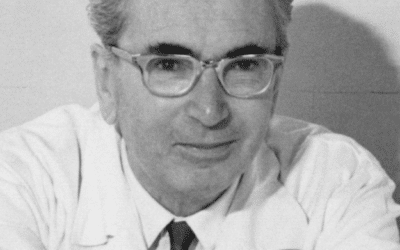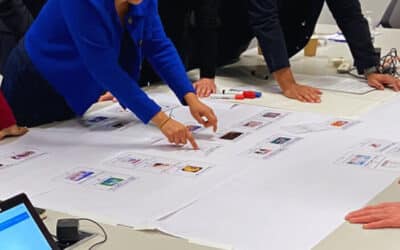An interview with Professor Tim Lenton by Dean Groman of Good Coaching. Interview first published on The Inspirer, a solutions journalism platform.
Has there been a big positive change in your life? Maybe you changed careers, changed your course of study, started a fitness routine, stopped smoking, took up yoga… If the answer is yes, whatever the change was, it probably had a profound, positive change on the way you live your life, and made you a different person : happier, fitter, more fulfilled…
If you think back to when the change took place, was there a pivotal moment? An enlightening encounter? A sudden realization? Something you read or watched? An emotional experience that finally pushed you out of your old path or habits and on the road to better things? That’s what we call a positive tipping point. Imagine if you could make these PTPs happen more frequently and more quickly – the time you could gain, the positive impact it could have on your life!
It’s the same for even more complex organisms than a single person. Communities, countries, economies, political regimes, even the planet we live on can experience PTPs. A good example is gas becoming cheaper than coal. In 2012, coal provided 40% of the UK’s energy. Today, it’s next to zero. How did this happen? And more importantly, how can we help make similar things happen more quickly to improve the world we live in?
That question is the obsession of Tim Lenton, Professor of Climate Change at Exeter University in the south-west of England. To learn more about positive tipping points, I spoke to Pr Lenton, and here is our conversation.
What made you decide to focus on positive tipping points?
Fifteen to twenty years ago I was thinking and writing about negative tipping points and the effect they have on our environment. Gradually I realized that although it is interesting to understand the feedback loops that support these negative changes, it doesn’t really help. I realised I needed to contribute to finding solutions. To focus less on the “why are we here”, and more on the “how do we get out of this situation”.
Was this a personal PTP for you?
It was more of a progressive journey than a sudden gear-shift. I found that with every talk I was putting more and more emphasis on the positive side of tipping points.
You mentioned feedback loops. Can you explain what you mean by that, and how you would describe positive tipping points in a simple way?
Tipping points can occur in complex systems, such as societies. An economic or social system is made up of a huge amount of moving parts, all interacting with each other : governments, regulatory bodies, companies, financial systems, social networks, groups of people, individuals… Despite their complexity, these systems tend to get stuck in ruts, and continue to do certain things in the same way. For example, since around 1915 and until recently, the preferred form of land transport for individuals has been fossil-fuel powered vehicles. Even though this part of our social system has varied over the years (cars getting bigger, then smaller, more diverse, more economical…), the automobile has resisted any radical change to its basic nature : how it is powered. Until now. In Norway, for example, sales of electric cars have recently overtaken those of petrol powered ones.
The positive tipping point occurred when it became cheaper to buy an electric car.
And this was achieved thanks to feedback loops?
Yes. For example, a loop we can call “learning by doing”. The more you do something, the more you learn about how to do it. And the more you learn about how to do it, the easier it becomes, and the more you will be inclined to do it. In this case, learning how to make electric cars by trying to make them has helped move towards the PTP.
Another example?
Economies of scale. The more you make something, the cheaper it becomes to make it, and the cheaper it is to make it, the more people will buy it, and the more you will make and sell it, and so on. In the case of e-cars in Norway, it was the cost of the battery that was prohibitive. Once the economies of scale feedback loop helped push the cost down, we moved closer to the PTP.
Are there other types of positive feedback loops? In social behaviours, for example?
Indeed there are. What we call social contagion is very important. This is the way we imitate each other to spread new norms, behaviours or technology. An example of this is how the adoption of solar panels in a community is very much influenced by people seeing their neighbours installing them.
Are these changes not also influenced by government policy?
Policy is an important factor, especially at the beginning of these processes in order to nurture the change in its infancy ; also the behaviours of companies and investors. Then the positive, reinforcing feedback loops will kick in. In the case of solar panels, we can see economies of scale, learning by doing and social contagion all playing a part.
Covid-19 seems to have been a unique moment in human history – for perhaps the time ever, the majority of humanity was concurrently focused on finding solutions to a problem that we collectively feared. Do you see any relation between how people and societies reacted to Covid-19 and what we need to do to begin encouraging a transformative rate of change in the face of the climate crisis?
Covid is one of several shocks we have had to face in the last few years. The system is convulsing and we absolutely need to embrace transformation to get back to a flourishing state. The most obvious positive reaction to Covid is that we simply stopped doing a lot of things that we really don’t need to do, particularly certain types of work and travel that are harmful to the environment. Many people have become less mobile but happier as a result.
Another interesting aspect of the Covid crisis we have been looking at are the factors that influenced the ability of certain countries to recover more quickly than others in terms of the decrease in numbers of infections and deaths. What we found was that countries where there is a generalised trust in society recovered more quickly. In societies where people trusted authorities and social norms on questions such as social distancing, mask-wearing and vaccinations, the rates of infection and death declined more rapidly. This is again a positively reinforcing loop, as the more people trust their society, the more they will take preventative action, and so the more effective the measures will be, thus inspiring more trust.
The majority of us are plugged into news sources that do not shine their spotlights on positive tipping points that hold promise or may be currently underway. Quite on the contrary, the news pipeline tends to be rather depressing or disempowering. What do everyday people need to know and understand about positive tipping points?
That there is real evidence that they have happened. Evidence-based storytelling is the key. We need to fight the nefarious forces of fake news and get these real stories out there. The most effective change will come when all areas of society are aligned in the messaging, be it governments, corporations, religious communities and especially the media in the broad sense, that is if they can switch from their usual fare of doom and gloom. The examples we have talked about are real and tangible – coal burning tipped out of power generation, e-vehicles tipped into the majority… other examples are in the areas of diet transformation and regenerative agriculture. People should also know that PTPs can continue to happen, and more quickly if we can trigger or accelerate the right behaviours. An important part of our work is to implement early-warning systems to anticipate positive tipping points so that we can leverage the feedback loops that will bring them more quickly to tipping point.
Is there any benefit for schoolchildren to be getting their heads around positive tipping points ? Is this the type of thing that should also be taught and discussed in classrooms?
Yes! In fact, I have just started writing a book to popularize this area. We have all been educated with the wrong world view, where linear thinking dominates. We tend to think in terms of cause and effect, in straight lines. In reality, any cause can have several different effects, and any effect can come from many different causes. The world is a complex, adaptative, living system, riddled with feedback loops. In fact, systemic thinking, the ability to see the world and its interactions as a complex system, is the number one requested capability for candidates in many sectors of activity. This is why I teach this subject.
Regarding James Lovelock, I read that you said “We need Jim Lovelock’s way of thinking now more than ever if we are to get out of a climate and ecological crisis of our own making.” For people who may not have had the chance to know or listen to James Lovelock, could you tell me a bit more about what you mean when you talk about his “way of thinking” and why this type of thinking is so vital, no more than ever?
James Lovelock’s work was centred on the Gaia hypothesis – a new understanding of the earth as a living organism where all elements are tied together in a self-regulating system. It is, in essence, a life-support system. And we have been trashing it ! We need to find productive ways of escaping this ecological mess, to nurture innovation so we can get out trouble.
At your life’s end, what accomplishment will you be happy with?
I’ll be happy if I have played even a small part in getting us out of this place and into a brighter future.
Crédit Photo : Drew Beamer - Unsplash




